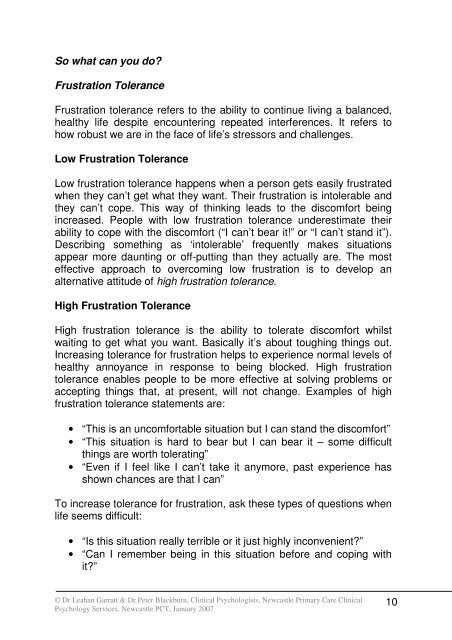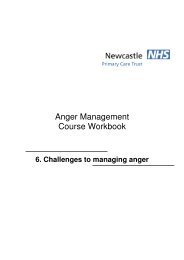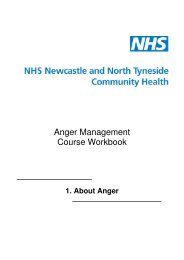Anger Management Course Workbook - Newcastle Psychological ...
Anger Management Course Workbook - Newcastle Psychological ...
Anger Management Course Workbook - Newcastle Psychological ...
Create successful ePaper yourself
Turn your PDF publications into a flip-book with our unique Google optimized e-Paper software.
So what can you do?<br />
Frustration Tolerance<br />
Frustration tolerance refers to the ability to continue living a balanced,<br />
healthy life despite encountering repeated interferences. It refers to<br />
how robust we are in the face of life’s stressors and challenges.<br />
Low Frustration Tolerance<br />
Low frustration tolerance happens when a person gets easily frustrated<br />
when they can’t get what they want. Their frustration is intolerable and<br />
they can’t cope. This way of thinking leads to the discomfort being<br />
increased. People with low frustration tolerance underestimate their<br />
ability to cope with the discomfort (“I can’t bear it!” or “I can’t stand it”).<br />
Describing something as ‘intolerable’ frequently makes situations<br />
appear more daunting or off-putting than they actually are. The most<br />
effective approach to overcoming low frustration is to develop an<br />
alternative attitude of high frustration tolerance.<br />
High Frustration Tolerance<br />
High frustration tolerance is the ability to tolerate discomfort whilst<br />
waiting to get what you want. Basically it’s about toughing things out.<br />
Increasing tolerance for frustration helps to experience normal levels of<br />
healthy annoyance in response to being blocked. High frustration<br />
tolerance enables people to be more effective at solving problems or<br />
accepting things that, at present, will not change. Examples of high<br />
frustration tolerance statements are:<br />
• “This is an uncomfortable situation but I can stand the discomfort”<br />
• “This situation is hard to bear but I can bear it – some difficult<br />
things are worth tolerating”<br />
• “Even if I feel like I can’t take it anymore, past experience has<br />
shown chances are that I can”<br />
To increase tolerance for frustration, ask these types of questions when<br />
life seems difficult:<br />
• “Is this situation really terrible or it just highly inconvenient?”<br />
• “Can I remember being in this situation before and coping with<br />
it?”<br />
© Dr Leahan Garratt & Dr Peter Blackburn, Clinical Psychologists, <strong>Newcastle</strong> Primary Care Clinical<br />
Psychology Services, <strong>Newcastle</strong> PCT, January 2007<br />
10






